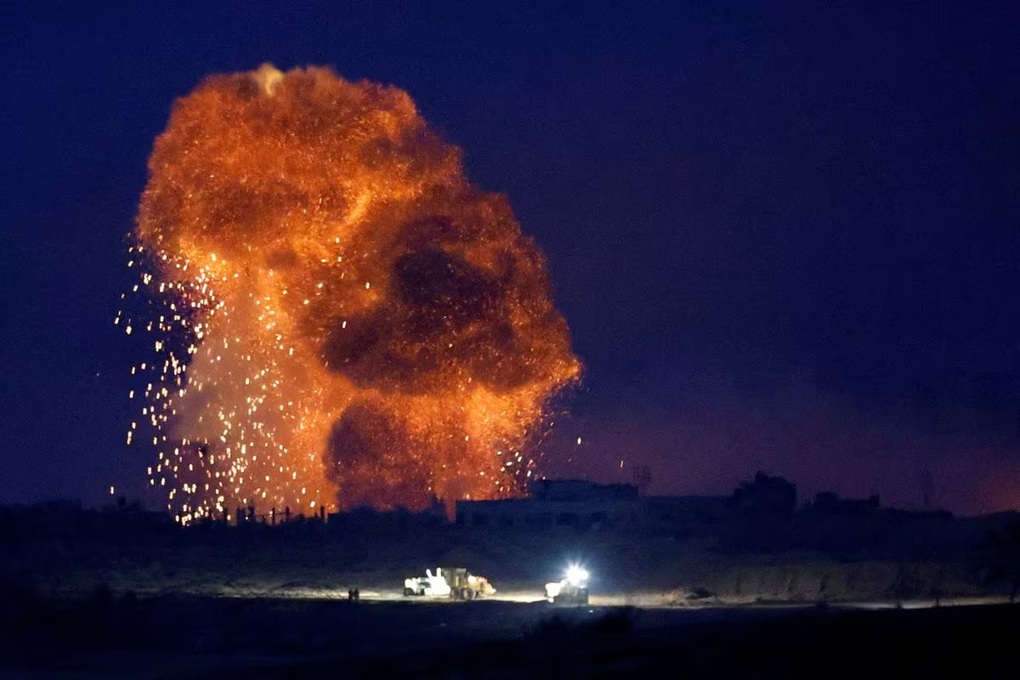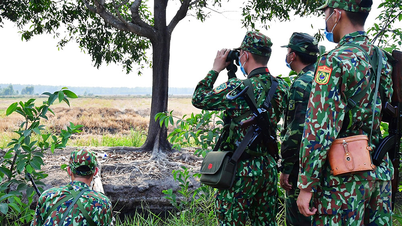
A large explosion in Gaza after an Israeli airstrike on November 23 (Photo: Reuters).
Smoke billowed into the sky over the northern Gaza war zone early on November 23, accompanied by the intense sounds of gunfire and explosions.
In the Rafah area on the southern edge of Gaza, people use their bare hands to search for faint hope in the rubble that used to be their homes.
A man cries amid the devastation as another man puts a comforting hand on his shoulder. Neighbor Khaled Hamad said the house used to be the home of a primary school teacher and their children were inside when it collapsed.
The Israeli military said on November 23 that it had carried out 300 air strikes on the Gaza Strip in the past 24 hours, a day after Israel and Hamas reached a temporary ceasefire and hostage exchange agreement. Israel said the deal would not be implemented until at least December 24.
"We will continue to push for hostage release negotiations. According to the initial agreement, the hostages will not be released until at least November 24," Israeli National Security Adviser Tzachi Hanegbi said in a statement overnight.
According to the latest announcement from Qatar, the country that acts as a mediator between Israel and Hamas, the ceasefire in Gaza will take effect from 7:00 a.m. on November 24 local time.
Under the deal, Hamas agreed to release 50 hostages, mostly women and children, that it had taken from Israel to Gaza during the raid on October 7. In return, Israel would release 150 Palestinian prisoners from its jails.
Israel will also cease fire for four days or longer, as long as they receive at least 10 hostages per day.
Both sides have vowed to return to battle as soon as the ceasefire ends.
"We will not stop this war. We will continue until we win," Israeli Chief of Staff Lieutenant General Herzi Halevi told Israeli military commanders in a video released on November 23.
In another related development, Israel confirmed that it had arrested al-Shifa Hospital Director Muhammad Abu Salmiya and many other medical staff in the Gaza Strip.
Gaza's health authority has demanded an explanation from the World Health Organization (WHO) as to why its doctors were stopped and detained by Israeli forces while traveling in an organisation convoy.
Ashraf al-Qudra, spokesman for the Gaza Health Authority, said his agency had decided to stop coordinating with the WHO on the evacuation until it received answers.
The Israel-Hamas conflict has lasted nearly two months, killing more than 1,200 people in Israel and about 14,000 people in Gaza. This is the most serious conflict between Israel and Hamas in decades. Observers fear the conflict could escalate and prolong, making the humanitarian crisis in Gaza even worse.
Source























































![[Maritime News] Container shipping faces overcapacity that will last until 2028](https://vphoto.vietnam.vn/thumb/402x226/vietnam/resource/IMAGE/2025/7/30/6d35cbc6b0f643fd97f8aa2e9bc87aea)










































Comment (0)